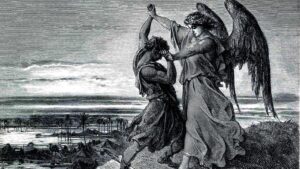
Jacob Struggles with His Legacy
We now begin to consider the saga of Jacob, the third member of the Abraham Triad that formed such a crucial point of reference for the Jewish people for all following generations, to the current day and into eternity.![]() Life is received and lived by the blessing and power of “The God of Abraham, Isaac, and Jacob”. The faithful Jew, beginning with Abraham and lasting through the Millennial Kingdom, will stake their survival and success on their faithfulness of that God, the only One True God.
Life is received and lived by the blessing and power of “The God of Abraham, Isaac, and Jacob”. The faithful Jew, beginning with Abraham and lasting through the Millennial Kingdom, will stake their survival and success on their faithfulness of that God, the only One True God.
It’s notable that Genesis 27-36, covering Jacob’s life, is 20% of Moses’ Pentateuch, so we would expect some important information is to be found. Jacob was born at about 1700 BC and his family’s history covers the last half of Genesis, with his death described in Gen. 49:29-33 when he was 147 years old. Although Jacob is far from perfect, God accomplished His divine purposes, even through all the anxiety and disappointments, as well as through the good things with which God blessed Jacob. The root of his name can be understood to mean “deceiver” and perhaps we can see him often living up to that theme. Sometimes Jacob seems to behave a lot like we do today, so we need to learn what God has for us out Jacob’s life.
 One of the most important events in Jacob’s life is wrestling with God (Gen. 32). After Jacob “prevailed”, God renamed him “Israel” (Abram and Sarai are the only others in the Bible whom God did this with). The force of God’s authority residing in this act, His commanding authority over His people, serves to move the history of the Jews forward through the remainder of His great plan of Redemption for Mankind. Israel, the Jewish people, have suffered through a tumultuous history all of their days – the flight from Egypt, the reign of David, the magnificent Temple of Solomon, the horrific apostasy, idolatry and sin which led to repeated destruction until finally led captive by Assyria and Bablyon, and even the Holocaust.
One of the most important events in Jacob’s life is wrestling with God (Gen. 32). After Jacob “prevailed”, God renamed him “Israel” (Abram and Sarai are the only others in the Bible whom God did this with). The force of God’s authority residing in this act, His commanding authority over His people, serves to move the history of the Jews forward through the remainder of His great plan of Redemption for Mankind. Israel, the Jewish people, have suffered through a tumultuous history all of their days – the flight from Egypt, the reign of David, the magnificent Temple of Solomon, the horrific apostasy, idolatry and sin which led to repeated destruction until finally led captive by Assyria and Bablyon, and even the Holocaust.
When the Messiah came in the person of Jesus Christ, the promised Seed that God prevailed and brought along through Isaac and Jacob and through their descendants all the way to the birth of Christ, through all the upheavals, apostasy and revival, a total of 42 generations (as Matthew describes it in Matt. 1:17) had been involved in heartfelt anticipation of the Messiah. Jacob’s legacy looms large in the history of mankind, as God intended. Although he falters at times, and in spite of the disconnect that developed in his family, his blessing to Isaac made it clear that the Promise of the Abrahamic Covenant was fully active in the work of God. Jacob lived a “crisis faith”, often living a worldly life like the pagans, but when plans collapsed, he would turn to God. He had a “minimal spiritual walk”, lacking in spiritual fruit and only demonstrating faith in God in times of crisis.
 The Backstory
The Backstory
In Gen. 25:19, a new “toledoth” or generation is beginning. Isaac had moved around a lot, trying to stay away from Abimelech’s control, securing wells and providing for his growing family. Finally he makes it back to ![]() Beersheba (Gen. 26:23), a place recognized by Abraham as one of blessing and provision from God (Gen. 21:33). Beersheba is located in the southern area of Canaan Judges 20:1), the name means to have found water. Beersheba is
Beersheba (Gen. 26:23), a place recognized by Abraham as one of blessing and provision from God (Gen. 21:33). Beersheba is located in the southern area of Canaan Judges 20:1), the name means to have found water. Beersheba is  where Abraham planted a tamarisk tree, where God revealed Himself to Hagar, Isaac, Jacob, and to Elijah. Amos names it along with Gilgal and Bethel as a primary place of worship for the Lord Jehovah (Amos 5:5).Here God recertifies with Isaac His covenant promises to the one carrying the seed of promise leading to the Messiah and fulfillment of the three promises of Land, Seed and Blessing. The generations to follow through Jacob and Esau come into view through the lens of struggle between them.
where Abraham planted a tamarisk tree, where God revealed Himself to Hagar, Isaac, Jacob, and to Elijah. Amos names it along with Gilgal and Bethel as a primary place of worship for the Lord Jehovah (Amos 5:5).Here God recertifies with Isaac His covenant promises to the one carrying the seed of promise leading to the Messiah and fulfillment of the three promises of Land, Seed and Blessing. The generations to follow through Jacob and Esau come into view through the lens of struggle between them.
We have to note that it wasn’t the manipulative cunning of Jacob and his mother which “got” him the birthright – it was the sovereignty of God, His elective, intended will that Jacob have the blessing. God’s divine work of election has been functioning since the beginning of Creation. Based on knowing what He wants to accomplish for Mankind, knowing who is going to do what, and on the basis of His fore-knowledge, He chooses the person who will do what He desires. This is the real backstory: God is still in control and is sovereign over the affairs of man – He presides over both good and bad people, and good and bad events. We have to recognize that God led Jacob to Beersheba by divine design, not happenstance.
Talk About Drama…
Looking through these next chapters, Gen. 27-33, the major events in Jacob’s life were centered around dramatic events, some inspired by God, some conspired by Jacob. Jacob, it seems, is just One Big Drama – perhaps that might cause you to be thinking about how much drama God sees in your life. It is worth noting that with all the dramatic dust Jacob stirs up, his  life is dramatically eclipsed by one of the greatest dramatic events in all the Bible: Joseph! This underscores an important life lesson for us: Whether or not we have lived a consistent life of faith, experiencing successes and failures in our walk with God, our ongoing commitment to God and His Word will prevail to enable Him to work in and through our life. It is true that God often works good things in our life in spite of us!
life is dramatically eclipsed by one of the greatest dramatic events in all the Bible: Joseph! This underscores an important life lesson for us: Whether or not we have lived a consistent life of faith, experiencing successes and failures in our walk with God, our ongoing commitment to God and His Word will prevail to enable Him to work in and through our life. It is true that God often works good things in our life in spite of us!
As noted, Jacob’s story is given a lot of coverage in Genesis and for this study we can only lay a foundation for understanding Jacob as we observe God moving His plan along with His chosen man. Even as Rebekah gives birth to her two twin sons (Gen. 25:19-28), God introduced a dramatic twist as the boys were born with Jacob hanging on to Esau’s heel. God revealed that the “older” Esau will serve the “younger” Jacob. It was God’s foreordained choice that the Seed of God’s Eternal Blessing would be passed along through Jacob. So drama it is, and it does continue, so let’s review as we observe God’s faithfulness and power to bring about His plan for mankind.
Setting up for the drama, Gen. 25:28-33
The struggle between Isaac and Rebekah is alluded to early on (Gen. 25:28), with the birth of the boys and God’s declaration as backdrop. Rebekah had struggled with being barren, just as it had been true of Sarah and would be for Rachel. It is regrettable to see the special union between Isaac and Rebekah spoiled and separated by dysfunctional priorities not only of their own making but also by their parents. In Gen. 25:23, when Rebekah finally was pregnant, God revealed to her that she was to have twins, and that their separate offspring would result in two different nations of people. God also revealed to her that the older son Esau would “serve” the younger Jacob . She and Isaac both knew the truth but they were determined to influence the boys’ destinies differently.
Isaac favored Esau and Rebekah loved Jacob. Esau was an adventurer and hunter, probably headstrong and a bit detached, preferring to be out discovering the world. Jacob was a quiet, solid man oriented to building a comfortable home, probably focused on having a stable life, preferring to stay at home. Note that both prove to have inherited the manipulative “streak” rooted in their relatives (Laban) and their parents. Beginning at their birth (Gen. 25:24-28), grabbing the heel of Esau, Jacob struggled to be first and in control.
The setting is further developed by the fateful interaction between Esau and Jacob in the “stew negotiation” episode (Gen. 25:29-33) when they were becoming young men. This probably wasn’t the first time they had gone back & forth about the birthright, but Esau apparently never cared about the birthright (Heb. 12:17) and Jacob was ready to take advantage of that. Although  this is a well-known story and an important milestone for the brothers, it is still preliminary to the drama to come later in Jacob’s life. We can picture Jacob at home in the kitchen with a fresh pot of stew simmering on the stove. Esau shows up as he returns from his latest adventure, worn out and starved. He’s impetuous and seeks immediate satisfaction. Considering that Mom and Dad were very aware of God’s previous revelation regarding the birthright, it is highly likely that the boys also understood the implications which that revelation would have for their own future. Yet like Isaac and Rebekah, they were had no issue with departing from God’s plan. Esau viewed the birthright poorly and Jacob saw it as a great future worthy to be pursued. Esau was focused on his immediate need for food, and his request to have some stew was met by an alert Jacob who siezed the opportunity to gain Esau’s willingness to surrender his right to the birthright. Esau’s shortsighted love of physical things got the best of him, his low view of the birthright meant immediacy and convenience would prevail. This choice has world history implications as the descendants of Esau descendants, the Edomites, are today the majority of the Muslim world and have been the ongoing enemies of God’s people Israel.
this is a well-known story and an important milestone for the brothers, it is still preliminary to the drama to come later in Jacob’s life. We can picture Jacob at home in the kitchen with a fresh pot of stew simmering on the stove. Esau shows up as he returns from his latest adventure, worn out and starved. He’s impetuous and seeks immediate satisfaction. Considering that Mom and Dad were very aware of God’s previous revelation regarding the birthright, it is highly likely that the boys also understood the implications which that revelation would have for their own future. Yet like Isaac and Rebekah, they were had no issue with departing from God’s plan. Esau viewed the birthright poorly and Jacob saw it as a great future worthy to be pursued. Esau was focused on his immediate need for food, and his request to have some stew was met by an alert Jacob who siezed the opportunity to gain Esau’s willingness to surrender his right to the birthright. Esau’s shortsighted love of physical things got the best of him, his low view of the birthright meant immediacy and convenience would prevail. This choice has world history implications as the descendants of Esau descendants, the Edomites, are today the majority of the Muslim world and have been the ongoing enemies of God’s people Israel.
On through life, Jacob would prove to be a manipulator, an indication of who he truly was inside, aside from God’s grace. First occurring with his brother, followed later in his ruthless deception of Laban, and then he would raise up sons who would be full of resentment, hatred, violence and even murder. We need to note that even though he was a mixture of craftiness and weakness, yet still he was the beginning of the Jewish nation through his twelve sons. He was still God’s man. There was a tragic side to his story, but we also know the hand of God was on him.
![]() Bible Study Journal
Bible Study Journal
- How do these verses apply to the forced deception of Isaac and final blessing of Jacob?
-
-
- Prov. 16:9
- Prov. 19:21
- If you know Christ as your Savior, you should be aware that God is active in your life. Can you think of ways that you see that to be true?
- As a Christian, knowing that you are seeking to please God in your life, is it reasonable to think we should sometimes need to manipulate outcomes? How is that different from simply seeking to make wise, God-honoring plans and decisions? How do Rom. 8:28-29, and Rom. 12:1-2 guide you regarding this?
-
-

st



